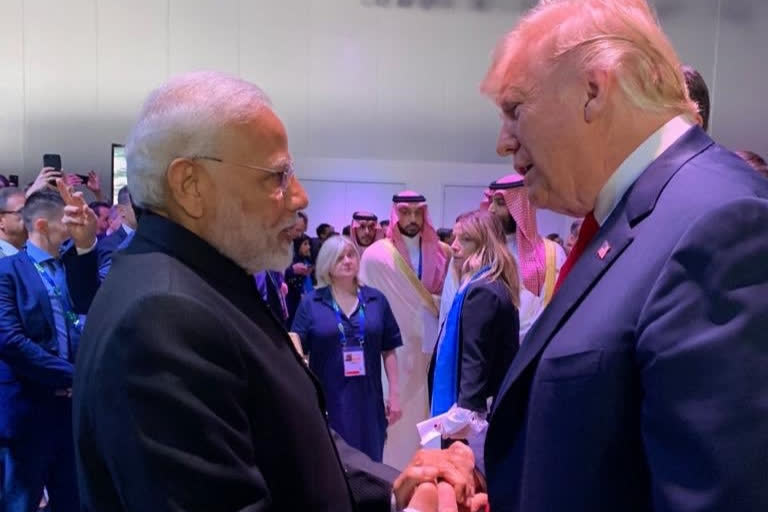Washington:President Donald Trump has terminated India's designation as a beneficiary developing nation under the key GSP trade programme after determining that it has not assured the US that it will provide "equitable and reasonable access to its markets."
The Generalized System of Preference (GSP) is the largest and oldest US trade preference programme and is designed to promote economic development by allowing duty-free entry for thousands of products from designated beneficiary countries.
Read:| Japan takes steps to reduce plastic waste before G20
"I have determined that India has not assured the US that it will provide equitable and reasonable access to its markets. Accordingly, it is appropriate to terminate India's designation as a beneficiary developing country effective June 5, 2019," Trump said in a proclamation on Friday ignoring the plea made by several top American lawmakers.
On March 4, Trump announced that the US intends to terminate India's designations as a beneficiary developing country under the GSP programme. The 60-day notice period ended on May 3.
The Trump administration has prioritised working with the Government of India to ensure that US companies have a level-playing field, a senior State Department official told reporters on Thursday, hours after Narendra Modi was sworn-in as Prime Minister for a second time following his spectacular electoral victory in the general elections.
Under the GSP programme, nearly 2,000 products including auto components and textile materials can enter the US duty-free if the beneficiary developing countries meet the eligibility criteria established by Congress.
India was the largest beneficiary of the programme in 2017 with USD 5.7 billion in imports to the US given duty-free status and Turkey the fifth largest with USD 1.7 billion in covered imports, according to a Congressional Research Service report issued in January.
The GSP criteria includes, among others, respecting arbitral awards in favour of the US citizens or corporations, combating child labour, respecting internationally recognised worker rights, providing adequate and effective intellectual property protection, and providing the US with equitable and reasonable market access.
Countries can also be graduated from the GSP programme depending on factors related to economic development.
In a statement, Coalition for GSP executive director Dan Anthony said Trump's decision will cost American businesses over USD 300 million in additional tariffs every year.
"Without GSP benefits American small businesses face a new tax that will mean job losses, cancelled investments and cost increases for consumers. Only a year after the Senate and House passed a three year reauthorisation of the GSP by a near unanimous margin, the Trump administration has kicked out the GSP country that saves American companies more money than any other," he said.
Read:| US withdraws tax exemption for Pakistan Embassy staff
Anthony said the Trump administration made the decision in the face of opposition from members of the Congress and hundreds of American businesses that have called for continued GSP eligibility for India.
"They also acted despite India's willingness to negotiate new market access for American exports. Thus, there are no winners from today's decision. American importers will pay more, while some American exporters will continue to face current market access barriers in India and others, including farmers, are very likely to be subject to new retaliatory tariff, Anthony said.
The Trump administration argues that New Delhi has failed to assure America that it will provide equitable and reasonable access to its markets in numerous sectors.
Meanwhile, India had said that the US government's move to withdraw duty concessions on certain products under the GSP programme will not have a significant impact on exports to America as the benefits were only about USD 190 million annually.
Commerce Secretary Anup Wadhawan in March said despite the fact that India was working on an "extensive and reasonable" trade package, the US decided to go ahead with its decision to scrap the preferential trade benefit.
The package was covering all concerns related to bilateral trade with the US on sectors including medical devices, dairy products and agricultural goods, he said adding that India could not negotiate issues concerning interests of public healthcare.
In a statement in March, the US Trade Representative (USTR) said that India has failed to provide the US with assurances that it will provide equitable and reasonable access to its markets in numerous sectors.
The Trump administration had launched an eligibility review of India's compliance with the GSP market access criterion in April 2018.
"India has implemented a wide array of trade barriers that create serious negative effects on United States commerce. Despite intensive engagement, India has failed to take the necessary steps to meet the GSP criterion," the USTR said.
Read:| India, Mauritius to strengthen ties further
